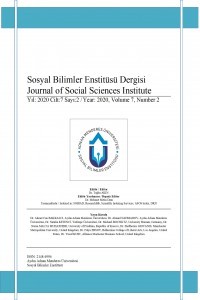Cumhurbaşkanlığı Hükümet Sistemine Geçişte 24 Haziran 2018 Seçimi Adaylarının Tweetlerinin Analizi
24 Haziran 2018 seçimleri Türkiye’nin yönetim sistemine yenilik getiren önemli bir dönüm noktasıdır. Yeni sistemle birlikte yürütmenin başı Cumhurbaşkanı olacak ve sistemin adı da Cumhurbaşkanlığı Hükümet Sistemi olacak. Bundan dolayı bu seçimde adayların ne yaptıkları, nelerin üzerinde daha çok durdukları seçmenler ve seçmenlerin kararları açısından önemlidir. Bu doğrultuda seçime katılmış olan adayların yapmış oldukları twitter paylaşımları bu araştırmada analiz edilmiştir. Sosyal medya olarak twitter’ın seçilmesinin nedeni ise burada yapılan paylaşımların kitlelere ulaşma süresinin daha hızlı ve kolay olduğunun düşünülmesidir. Adayların duygu ve düşüncelerine tercüman olan tweetler nitel veri analizine tabi tutulmuş ve sınıflandırılmıştır. 8 Ana Kod ve 13 Alt Kod ile yapılan bu sınıflandırma sonuçları bu çalışmada değerlendirilmiştir.
Anahtar Kelimeler:
24 Haziran 2018, Cumhurbaşkanlığı Hükümet Sistemi, Seçim, Nitel Analiz, Twitter
Analysis of The Tweet of The Candidates from the 24 June Selection
June 24, 2018 elections is an important milestone in bringing innovation to Turkey's administrative system. The head of the executive with the new system will be the President and the name of the system will be the Presidential Government System. Therefore, in this election, what the candidates are doing is important in terms of voters and voters' decisions about what they are more concerned about. In this direction, the twitter shares of candidates who have participated in the election have been analyzed in this research. The reason for choosing twitter as social media is to think that the time it takes to reach the masses is faster and easier. Tweets that are interpreters of the candidates' feelings and thoughts have been subjected to qualitative data analysis and classified. The results of this classification with 8 Main Codes and 13 Sub Codes were evaluated in this study.
Keywords:
June 24 2018, Presidential Government System, Elections, Qualitative Analysis, Twitter,
___
- Lilja Kristín Birgisdóttir. (2014). The rising influence of social media in politics: How Barack Obama Used Social Media as a Successful Campaign Tool in the 2008 and 2012 Elections, ss.7
- Aaker, Jennifer & Victoria Chang. (2009). Obama and The Power of Social Media and Technology.
- Fauziah Ahmad, Chang PengKee, NormahMustaffa, Faridah Ibrahim, Wan Amizah Wan Mahmud &Dafrizal. (2012). Information Propagation and the Forces of Social Media in Malaysia. Asian Social Science, 8(5), 71-76.
- MohdAzizuddinMohdSani & Knocks TapiwaZengeni. (2010). “Democratisation in Malaysia: The Impact of Social Media in the 2008 General Election”. 18th Biennial Conference of the Asian Studies Association of Australia in Adelaide.
- Aragon, P., Kappler, K., Kaltenbrunner, A., Laniado, D., & Volkovich, Y. (2013). Communication dynamics in Twitter during political campaigns: The case of the 2011 Spanish national election. Policy & Internet, 5 (2), 183-206.
- Eray, T., Aslan A. (2016). “Türkiye’de Siyasal Partilerin Web Sayfalarının Diyalojik İletişim Açısından İncelenmesi”, İnönü Üniversitesi İletişim Fakültesi Elektronik Dergisi, ss.112-113
- Aziz, A. (2003). Siyasal İletişim, Nobel Yayınevi, Ankara, ss.8
- Bente Kalsnes. (2016). The Power Of Likes: Social Media Logıc and Political Communication, ss.34
- http://www.sosyalmedyahaber.com/2018/03/2018-guncel-sosyal-medya-kullanici-sayilari/ - 25/06/2018
- https://dijilopedi.com/2018-turkiye-internet-kullanim-ve-sosyal-medya-istatistikleri/ - 25/06/2018
- https://www.wearesocial.com/ - 25/06/2018
- Sereyvisith Sokhan. (2014). Social Media and its Political impact: A Case Study of Cambodia 2013 Election, ss.12
- Alina Muntean. (2015). The Impact of Social Media Use of Political Participation, Master Thesis, August, ss.82-83
- Aindrila Biswas, Nikhil Ingle and Mousumi Roy. (2014). “Influence of Social Media on Voting Behavior”, Journal of Power, Politics & Governance, ss.153
- Penplusbyte.org (2017) – Social Media and Political Campaigning in Ghana, ss.15
- Yayın Aralığı: Yılda 2 Sayı
- Başlangıç: 2014
- Yayıncı: Aydın Adnan Menderes Üniversitesi
Sayıdaki Diğer Makaleler
Sosyal Bilgiler Öğretmen Adaylarının Ortadoğu Coğrafyası Hakkındaki Farkındalıkları
Cumhurbaşkanlığı Hükümet Sistemine Geçişte 24 Haziran 2018 Seçimi Adaylarının Tweetlerinin Analizi
Dîvânu Lugâti’t-Türk‘ten Hareketle Kazak Türkçesindeki Arkaik Fiiller
OECD Ülkelerinde Girişimcilik Faaliyetlerinin Ekonomik Büyüme Üzerine Etkisi: Panel Veri Analizi
Emrah Eray AKÇA, Harun BAL, Müge MANGA
Kemer-Edremit (Burhaniye) Kazası ve Osmanlı Devleti’nin Zahire İaşesine Katkısı
Hazar Havzası’nda Enerji Güvenliği ve Enerji Jeopolitiği
Turizm Öğrencilerinin Stajda Sanal Kaytarma Eylemleri
Reyhan ARSLAN AYAZLAR, Ezgi SAYMAN, Mesut ÇINAR
Türkiye’nin Enerji Politikalarının, Nükleer Enerji Tercihindeki Etkisi
